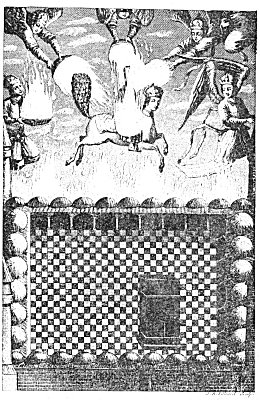Mohammed would have lived and died an honored and respected Meccan had he not unhesitatingly sacrificed both his wealth and social position in the service of the God whose voice he heard while meditating in the cavern on Mount Hira in the month of Ramadan. Year after year Mohammed climbed the rocky and desolate slopes of Mount Hira (since called Jebel Nur, “the Mountain of light”) and here in his loneliness cried out to God to reveal anew the pure religion of Adam, that spiritual doctrine lost to mankind through the dissensions of religious factions. Khadijah, solicitous over her husband’s ascetic practices which were impairing his physical health, sometimes accompanied him in his weary vigil, and with womanly intuition sensed the travail of his soul. At last one night in his fortieth year as he lay upon the floor of the cavern, enveloped in his cloak, a great light burst upon him. Overcome with a sense of perfect peace and understanding in the blessedness of the celestial presence, he lost consciousness. When he came to himself again the Angel Gabriel stood before him, exhibiting a silken shawl with mysterious characters traced upon it. From these characters Mohammed gained the basic doctrines later embodied in the Koran. Then Gabriel spoke in a clear and wonderful voice, declaring Mohammed to be the Prophet of the living God.
In awe and trembling, Mohammed hastened to Khadijah, fearing the vision to have been inspired by the same evil spirits who served the pagan magicians so greatly despised by him, Khadijah
MOHAMMED’S NIGHT JOURNEY TO HEAVEN.
From D’Ohsson’s Tableau Général de l’Empire Othoman. In the seventeenth sura of the Koran it is written that upon a certain night Mohammed was transported from the temple at Mecca to that of Jerusalem, but no details are given of the strange journey. In the Mishkāteu ’l-Masabih, Mohammed is made to describe his ascent through the seven heavens into the icy presence of the may-veiled God and his subsequent return to his own bed, all in a single night. Mohammed was awakened in the night by the Angel Gabriel, who, after removing the Prophet’s heart, washed the cavity with Zamzam water, and filled the heart itself with faith and science. A strange creature, called Alborak, or the lightning bolt, was brought for the conveyance of the Prophet. Alborak is described as white animal of the shape and size of a mule, with the head of a woman and the tail of a peacock. According to some versions, Mohammed merely rode Alborak to Jerusalem, where, dismounting upon Mount Moriah, he caught hold of the lower rung of a golden ladder lowered from heaven and, accompanied by Gabriel, ascended through the seven spheres separating he earth from the inner surface of the empyrean. At the gate of each sphere stood me of the Patriarchs, whom Mohammed saluted as he entered the various planes. At the gate of the first heaven stood Adam; at the gate of the second, John and Jesus (sisters’ sons); at the third, Joseph; at the fourth, Enoch; at the fifth, Aaron; at the sixth, Moses; and at the seventh, Abraham. Another order of the Patriarchs and prophets is given which places Jesus at the gate of the seventh heaven, and upon reaching this Point Mohammed is said to have requested Jesus to intercede for him before the throne of God.
p. 190
assured him that his own virtuous life would be his protection and that he need fear no evil. Thus reassured, the Prophet awaited further visitations from Gabriel. When these did not come, however, such a despair filled his soul that he attempted self-destruction, only to be stopped in the very act of casting himself over a cliff by the sudden reappearance of Gabriel, who again assured the Prophet that the revelations needed by his people would be given to him as necessity arose.
Possibly as a result of his lonely periods of meditation, Mohammed seemingly was subject to ecstatic swoons. On the occasions when the various suras of the Koran were dictated he is said to have fallen unconscious, and, regardless of the chill of the surrounding air, to have been covered with beads of perspiration. Often these attacks came without warning; at other times he would sit wrapped in a blanket to prevent a chill from the copious perspiration, and while apparently unconscious would dictate the various passages which a small circle of trusted friends would either commit to memory or reduce to writing. On one occasion in later life when Abu Bekr referred to the gray hairs in his beard, Mohammed, lifting the end of his beard and looking at it, declared its whiteness to be due to the physical agony attendant upon his periods of inspiration.

Moe is the founder of GnosticWarrior.com. He is a father, husband, author, martial arts black belt, and an expert in Gnosticism, the occult, and esotericism.


![How when King Penda was slain, the province of the Mercians received the faith of Christ, and Oswy gave possessions and territories to God, for building monasteries, as a thank offering for the victory obtained [655 A.D.] | Book 3 | Chapter 24 How when King Penda was slain, the province of the Mercians received the faith of Christ, and Oswy gave possessions and territories to God, for building monasteries, as a thank offering for the victory obtained [655 A.D.] | Book 3 | Chapter 24](https://www.gnosticwarrior.com/wp-content/plugins/contextual-related-posts/default.png)